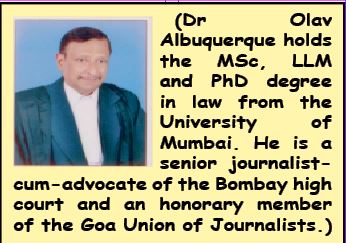It means the greatest good for the greatest number!
By Dr Olav Albuquerque
WHEN the legislature amends laws, it does so ostensibly for the good of the people. This means it is for the greatest good of the greatest number which is a legal axiom formulated by the 19th-century jurist, Jeremy Bentham. He posited that any law is good law only if it benefits the greatest number of people.
This is why the most recent amendment is that of the Goa Land Use (Regulation) Act, 1991 (GLUA) to allow the government to acquire land vested in tenants for public purposes. Given the enactment of the Right to Fair Compensation and Transparency in Land Acquisition, Rehabilitation and Resettlement Act (Central Act 30 of 2013), Goa’s bill seeks to amend Section 3 of this GLUA to set up projects for communities or to use land for public purposes.
This bill aims to allow land vested in tenants to be used by the local authorities such as the village panchayat, the municipal council, or the municipal corporation for public purposes such as setting up schools, colleges or gardens.
The bill also seeks to allow the use of such land by an educational institution with the prior approval of the government. Now, although at first sight, this seems a laudable objective, sometimes it may backfire if politicians are allowed to de-notify land to be used for public purposes.
Now, the definition of “public purpose” is not precisely defined in the Constitution of India, which allows the government to expand the public purpose definition to its limit to even include the acquisition of land for non-profit private companies.
There has always been a misuse of power vested with various state governments to acquire land for any public purpose. The judiciary is the only institution that has evolved new principles to regulate the acquisition of land and ensure there is no abuse of the process of law to the detriment of the people.
MISUSED GROSSLY
BUT even after the courts have intervened, the power of land acquisition in the name of public purpose has been grossly misused by various states. Goa is no exception. The Right to Fair Compensation and Transparency in Land Acquisition, Rehabilitation, and Resettlement Act, 2013) has also failed to be a good replacement for the old Land Acquisition Act, of 1894 to address the misuse.
The role and power of the government as the sole authority to decide what is a public purpose should be reduced and the role of the judiciary to protect the interest of the person whose land is acquired should be increased.
For example, it is not permissible to use agricultural land for residential purposes. But the tweaked rules allow farmhouses to be built in agricultural zones provided that the land is not classified as a rice or paddy field. “The maximum built-up area permissible for a farmhouse irrespective of the area of the plot will be 1,000m2 or 10% coverage whichever is lower,” declared a notification.
SPEEDY JUSTICE
THERE have been various amendments which have allowed disputes pertaining to mutations and other land matters to be transferred from the civil courts to the Mamlatdars’ courts to allow speedy disposal of cases. This is a laudable objective and in fact, the Mamlatdars’ courts have disposed of such cases speedily given that the new batch of Mamlatdars are LL.B graduates who speedily grasp the issues to be framed.
Till today, when the state government acquires land for a public purpose, the fair compensation given to land owners can be challenged before the collector who is in-charge of the district. But these matters still drag on for a long time. Civil courts are overburdened and cannot handle such matters when they have to dispose of more serious matters which have clogged the dockets of the courts for decades.
FINAL ANALYSIS
IN the final analysis, whether the tenants who have occupied their lands for decades will be awarded fair compensation, and whether the land will really be used for a public purpose which benefits the community at large, remains to be seen. Case law has yet to be developed on this aspect and only when such case law develops, it is possible to deduce how effective these amendments have been.
Until then, we just wait-and-watch to see whether the land acquisition process is fair, equitable and just.

